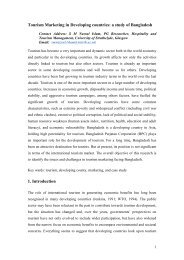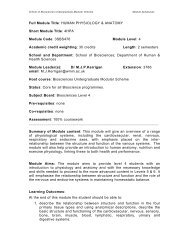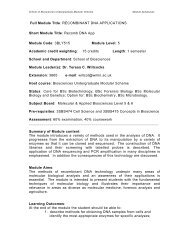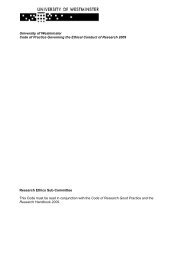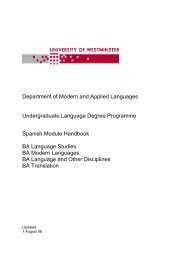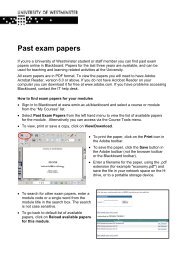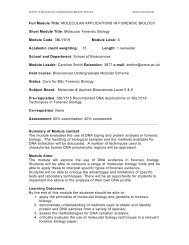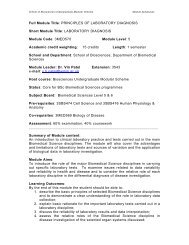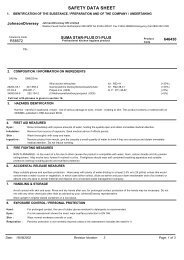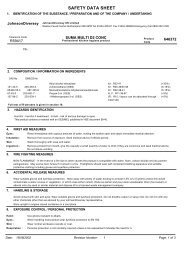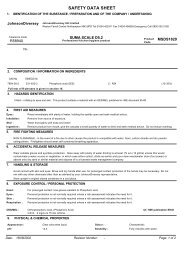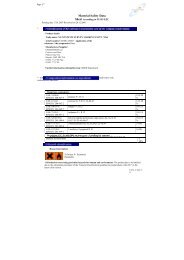CONTENTS 1. Introduction 1.1 Course Outline 1 1.2 Introduction ...
CONTENTS 1. Introduction 1.1 Course Outline 1 1.2 Introduction ...
CONTENTS 1. Introduction 1.1 Course Outline 1 1.2 Introduction ...
Create successful ePaper yourself
Turn your PDF publications into a flip-book with our unique Google optimized e-Paper software.
4. Subject Benchmarks<br />
Subject benchmark statements provide a means for the academic community to describe the<br />
nature and characteristics of programmes in a specific subject. They also represent general<br />
expectations about standards for the award of qualifications at a given level and articulate the<br />
attributes and capabilities that those possessing such qualifications should be able to<br />
demonstrate. The benchmark statements have been compiled by the Quality Assurance Agency<br />
(QAA) to be used as a guide for academics in developing and teaching course programmes, to<br />
define four key areas of knowledge and experience that should be acquired by a student<br />
graduating in a particular discipline. These are:<br />
• knowledge and understanding<br />
• cognitive and intellectual abilities<br />
• practical skills<br />
• transferable skills<br />
The benchmark statements are used to develop learning outcomes for each level of the course as<br />
a measure for both students and external agencies of the quality of educational provision.<br />
There are not specific benchmark statements for this discipline, therefore the statements used in<br />
this programme have been taken from a number of different disciplines: Engineering, Optometry,<br />
Communications (media, film and cultural studies), Mathematics, Computing, Chemistry,<br />
Optometry and Art & Design. They can be read in full on the QAA website at www.QAA.ac.uk.<br />
The full range of knowledge and skills defined in the learning outcomes can be mapped across<br />
the three levels of the programme. The learning outcomes at each level have been divided up<br />
into the four key areas defined in the benchmark statements to provide clear correlations. The<br />
course has been designed to provide a progressive building on fundamental theory and practical<br />
skills through core modules in each year. We are confident that the modules being offered will<br />
provide students with the opportunity to meet and exceed threshold standards set out in the<br />
benchmark statements.<br />
5. Skills<br />
The University’s Skills Policy comprises two elements: (i) HE (Key) and Career Management Skills<br />
(HE & CM Skills), and (ii) Personal Development Planning (PDP).<br />
5.1 Career Management Skills<br />
Career Management Skills have been developed to equip students with the ability to define and<br />
manage their own career development. By including them as a compulsory part of this degree<br />
course, students are given the opportunity to reflect upon the decisions they make, in their<br />
progression through the programme and how it will affect career aspirations and subsequent<br />
opportunities. The Career Management Skills module has been tailored for this degree<br />
programme to provide students with these essential skills, and includes areas such as decisionmaking,<br />
effective use of information sources, career guidance, development of employability skills<br />
and also contains a work placement component. Further details of the module content may be<br />
found in the course syllabus section at the back of this handbook.<br />
5.2 Key Skills<br />
HE skills are a range of general skills, also known as key or transferable skills which are not<br />
specific to a subject area, but will be useful to students in their lives and careers. These include<br />
areas such as group working, numeracy, problem-solving and communication and are embedded<br />
in modules at all levels of the course. These skills and their inclusion in individual modules are<br />
defined in the skills charts on the next few pages.<br />
DPI_Hbook 15 ©University of Westminster



